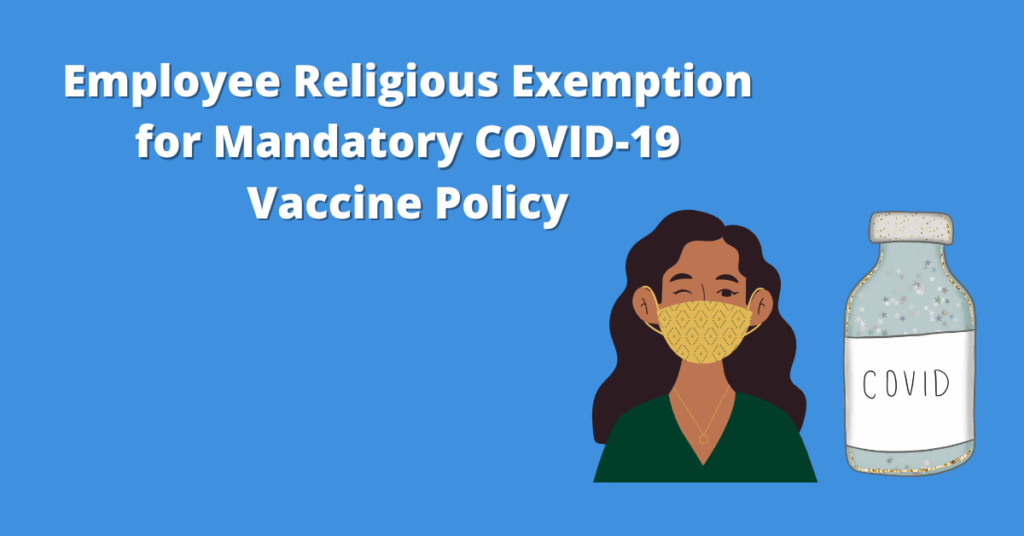
At some point in the near future, the Supreme Court is set to decide the Biden Administration’s mandate that employers of a certain size require that their employees are vaccinated. Some employees have been able to qualify for a religious exemption from the Covid-19 vaccine. This complex legal issue seeks to strike a balance between public health and safety and religious freedom. Employers need to navigate these situations with care because they can open themselves up to claims of discrimination.
The law requires that employers make reasonable accommodations for an employee’s religious beliefs. However, this is not an unlimited obligation. For example, an employer is allowed to consider the burdens that it would face in granting accommodations and can reject it if it would impose an undue burden. In other words, the employer can draw a line somewhere.
Companies Need Clear and Consistent Policies for Vaccine Exemptions
Employers should focus on the process of applying for a religious exemption as a way to protect themselves. The first thing that employers need is a very clearly spelled out policy to guide everything about the approval process. This policy will guide:
- The definition of religious exemption and a “sincerely held religious belief” would allow for an exemption.
- How requests are to be submitted and the form of the application
- Guidance on how the company will make decisions
It is best to have as much as possible in writing and to give guidance to the people making the decision. Drafting written policies and following them can help protect an employer.
The policies should provide for a formal written application. An employee should clearly state their reasons for not wanting to get the vaccine and state the exact nature of their religious objections to the vaccine.
Businesses Need Consistency in Reviewing Applications For Religious Exemption For The Covid-19 Vaccine
The company should have a single person reviewing all religious exemption applications to ensure consistency. If that is not possible, it should be done by a very small group. This should be a person well versed in federal laws, including those about discrimination. If the company has any uncertainty, they should get legal help because of the possible consequences. Employees are filing lawsuits in large numbers as employers make vaccines mandatory.
The employer should work for uniformity to the greatest extent possible. This means that the process should not be rushed. However, they will need to make difficult decisions that could expose them to liability.
In the end, employers may need to make a judgment call about the employee’s credibility. Unfortunately, it is often impossible to know whether the employee’s situation really is as they are relating to it. Therefore, there will always be some risk for an employer.
What Employers Must Consider in Exemption Decisions
There are two primary questions that employers will need to consider when deciding about exemption applications:
- First, is the religious religion cited for not wanting a vaccination legitimate?
- Is the employee’s sincerely held belief?
Both of these are often subjective decisions, and employers are not always on solid ground when they try to gauge whether their employees really believe what they say. The decision-makers could be particularly challenged when the employee is relying on a non-traditional reason for the exemption. Some employees could have legitimate reasons for the exemption, while others could have recently “adopted” faith with the sole intention of evading vaccine requirements.
Vaccination Exemptions Requests Should Have a Presumption of Legitimacy
However, employers should begin with a presumption that the religious exemption request is legitimate. They should be sure to consider religious beliefs that do not square with their own. While the ultimate decisions are up to the employer, they should be cautious about questioning an employee’s sincerity of beliefs because this could land them in legal trouble.
If the employer questions the religious vaccine exemption request, they should give the employee a further chance to explain themselves. They can request documents that could evidence what the employee is saying in their exemption request. It is best not to say no without further discussion.
This Will Not Be Easy for Employers
This is a difficult process for employers, who are required to make decisions that they would have never imagined making in the past. But, as COVID-19 appears to be with us for the long run, these will be questions at the forefront for years.
Employers may be caught between the proverbial rock and hard place when deciding applications for religious exemptions. One possible path is for them to offer employees alternative accommodation. Employers are not just limited to a yes or no answer about the religious exemption. Attempting to make some sort of accommodation, even if it is not exactly what the employee has requested, can protect the company from liability.
Why Businesses Will Need Legal Help
Companies should seek legal help at several parts of the process:
- A lawyer should either draft the policies or review them
- Companies should consult an attorney if they have any difficult decisions to make
- They should get counsel if an upset employee is threatening legal action
- Finally, it is unclear how and when the Department of Labor will enforce vaccine mandates. Companies may be subject to enforcement actions in the future when these rules take effect.
- Businesses must keep abreast of the latest developments and get advice on how to comply with them.
Contact a Virginia Employment Attorney For Religious Exemption For The Covid-19 Vaccine
The attorneys at McClanahan Powers can help your company deal with some of these difficult issues and get you in a position to make decisions as best as you can. Your company has been given a difficult task, and you must successfully navigate the waters. Our lawyers assist Virginia businesses, providing sensible legal solutions to challenging problems. Call us today at (703) 520-1326 or contact us online to learn how we can help you.